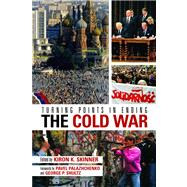
| A Perspective from Moscow | |
| A Perspective from Washington | |
| Introductory Essay: Talking Across the Cold War Divide | p. 1 |
| The End of Detente and the Reformulation of American Strategy: 1980-1983 | p. 11 |
| What Lessons Learned? | p. 40 |
| The Crisis that Didn't Erupt: The Soviet-American Relationship, 1980-1983 | p. 63 |
| An Alternative Conception of Mutual Cooperation | p. 93 |
| Gorbachev's Foreign Policy: The Concept | p. 111 |
| Moving to Globalization | p. 141 |
| Soviet-American Relations in the Third World | p. 149 |
| Reversal of Fortune? | p. 182 |
| Europe Between the Superpowers | p. 191 |
| Europe Between the Superpowers: A Soviet Perspective | p. 218 |
| German Unification | p. 229 |
| German Unification from the Soviet (Russian) Perspective | p. 255 |
| Boris Yeltsin: Catalyst for the Cold War's End | p. 273 |
| Boris Yeltsin: Catalyst for the Cold War's End? | p. 306 |
| Contributors | p. 327 |
| Acknowledgments | p. 333 |
| Index | p. 335 |
| Table of Contents provided by Blackwell. All Rights Reserved. |
The New copy of this book will include any supplemental materials advertised. Please check the title of the book to determine if it should include any access cards, study guides, lab manuals, CDs, etc.
The Used, Rental and eBook copies of this book are not guaranteed to include any supplemental materials. Typically, only the book itself is included. This is true even if the title states it includes any access cards, study guides, lab manuals, CDs, etc.